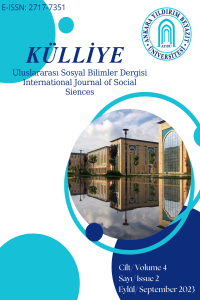Abstract
Argonun kelime anlamı, tarihi, tasnifi gibi meseleler çokça yazılmış ve özellikle dilbilimciler tarafından incelenmiş ancak edebî metne ne kattığı hususu üzerinde çok durulmamıştır. Kurmaca metinlerde argonun kullanımı tarihî birtakım gerekçelere, sosyolojik tespitlere, yazarın gerçekçilik arzusuna dayandırılmıştır. Oysa argonun metindeki işlevinin, edebî metnin içeriğinden ziyade dilin kullanımında yazarına nasıl bir imkân sağladığı sorusunun cevabına da bakmak gerekir. Argo, devrin diline bir itiraz olarak okunabilir.
Bu makalede Jonathon Green’in Slang A Very Short Introduction başlıklı çalışması temel alınarak argonun kuramsal yapısı incelenmiş, tasnif ve ölçütler üzerinde durulmuştur. Daha sonra Türkçede argonun tarihsel gelişimine ve Türkçedeki argo sözlüklerine kısaca değinilmiştir. Argonun edebî metinde nasıl bir işlevi olabileceği tartışılmış ve Kemal Tahir’in dil ile olan ilişkisi bu bağlam üzerinden değerlendirilmeye çalışılmıştır. Son olarak Esir Şehrin Mahpusu romanı, argo-dil-anlam bağlantılarıyla incelenmiş ve romancının argoyu nasıl örtük bir işlevde, kurulu düzenin itirazı olarak kullandığı gösterilmeye çalışılmıştır.
Keywords
References
- A. Fikrî (2019). Lugat-ı Garibe Türkçenin İlk Argo Sözlüğü, (D. Dolanbay, Haz.). Gram Yayınları.
- Akar, Ali (2014). Türk sözlük biliminde tanımsız bir alan: sövgü sözleri, Dil Araştırmaları, (14), 27-33.
- Akşin, S. (2013). Kısa Türkiye Tarihi. İş Bankası Yayınları.
- Aktunç, H. (1998). Türkçenin Büyük Argo Sözlüğü. YKY.
- Arslan, M. (2009). Argo Kitabı. Kitabevi Yayınları.
- Dauzat, A. (1938). Dictionnaire etymologique de la langue Française. Librairie Larousse.
- Develioğlu, F. (1980). Türk Argosu İnceleme ve Sözlük. Aydın Kitabevi.
- Geçer, G. O. (2007). Sokak çocuğu yaratmada argo tercihi ve romanlara yansıması, TÜBAR, (21), 87-108.
- Green, J. (2016). Slang a very short introduction. Oxford University Press.
- Güneş, İ. T. (2016). Ağır Roman’da argo kullanımı ve eserin söz varlığına etkisi, A. Ü. Türkiyat Araştırmaları Enstitüsü Dergisi, (55), 305-317.
- Hüküm, M. (2017). Şair-Sosyolog Kemal Tahir. İthaki Yayınları.
- Kefeli, E. (2016). Edebiyat argo ilişkisi. (E. G. Naskali- G.S. Yüksekkaya, Ed.). Argo kitabı içinde (199-214. ss.), Ka Kitap.
- Narlı, Mehmet (2010). Biyografi ve roman: Kemal Tahir’in hapishane romanları, hapishane insanları ve argosu, (E. Eğribel-M.F.Andı, Ed.). Kemal Tahir 100 Yaşında kitabı içinde, Kültür ve Turizm Bakanlığı Yayınları.
- Özkan, Nevzat (2016). Gizli dil olarak argonun fonksiyonu üzerine. (E. G. Naskali- G.S. Yüksekkaya, Ed.). Argo kitabı içinde (31-40. ss.), Ka Kitap.
- Şen, Mesut (2016). Argo kelimeleri üzerine. (E. G. Naskali- G.S. Yüksekkaya, Ed.). Argo kitabı içinde (19-20. ss.), Ka Kitap. Tahir, K. (2005). Esir Şehrin İnsanları. İthaki Yayınları. Tahir, K. (2007). Esir Şehrin Mahpusu. İthaki Yayınları. Tahir, K. (2016). Notlar Sanat Edebiyat 3 Dil Dosyası. İthaki Yayınları.
Abstract
Although issues such as the meaning of the word, history and classification of slang have been written extensively and especially studied by linguists; the issue of what it adds to the literary text has not been given much attention. The use of slang in fictional texts is based on some historical reasons, sociological determinations, and the author's desire for realism. However, it is necessary to look at the answer to the question of how the function of slang in the text provides an opportunity for the author in the use of language rather than the content of the literary text. Slang can be read as an objection to the language of the period.
In this article, based on Jonathon Green's Slang A Very Short Introduction, the theoretical structure of slang is examined and classification and criteria are emphasized. Then, the historical development of slang in Turkish and slang dictionaries in Turkish are briefly mentioned. The function of slang in literary texts is discussed and Kemal Tahir's relationship with language is evaluated in this context. Finally, the novel Esir Şehrin Mahpusu is analyzed in terms of slang-language-meaning connections and it is tried to show how the novelist uses slang in an implicit function as an objection to the established order.
Keywords
References
- A. Fikrî (2019). Lugat-ı Garibe Türkçenin İlk Argo Sözlüğü, (D. Dolanbay, Haz.). Gram Yayınları.
- Akar, Ali (2014). Türk sözlük biliminde tanımsız bir alan: sövgü sözleri, Dil Araştırmaları, (14), 27-33.
- Akşin, S. (2013). Kısa Türkiye Tarihi. İş Bankası Yayınları.
- Aktunç, H. (1998). Türkçenin Büyük Argo Sözlüğü. YKY.
- Arslan, M. (2009). Argo Kitabı. Kitabevi Yayınları.
- Dauzat, A. (1938). Dictionnaire etymologique de la langue Française. Librairie Larousse.
- Develioğlu, F. (1980). Türk Argosu İnceleme ve Sözlük. Aydın Kitabevi.
- Geçer, G. O. (2007). Sokak çocuğu yaratmada argo tercihi ve romanlara yansıması, TÜBAR, (21), 87-108.
- Green, J. (2016). Slang a very short introduction. Oxford University Press.
- Güneş, İ. T. (2016). Ağır Roman’da argo kullanımı ve eserin söz varlığına etkisi, A. Ü. Türkiyat Araştırmaları Enstitüsü Dergisi, (55), 305-317.
- Hüküm, M. (2017). Şair-Sosyolog Kemal Tahir. İthaki Yayınları.
- Kefeli, E. (2016). Edebiyat argo ilişkisi. (E. G. Naskali- G.S. Yüksekkaya, Ed.). Argo kitabı içinde (199-214. ss.), Ka Kitap.
- Narlı, Mehmet (2010). Biyografi ve roman: Kemal Tahir’in hapishane romanları, hapishane insanları ve argosu, (E. Eğribel-M.F.Andı, Ed.). Kemal Tahir 100 Yaşında kitabı içinde, Kültür ve Turizm Bakanlığı Yayınları.
- Özkan, Nevzat (2016). Gizli dil olarak argonun fonksiyonu üzerine. (E. G. Naskali- G.S. Yüksekkaya, Ed.). Argo kitabı içinde (31-40. ss.), Ka Kitap.
- Şen, Mesut (2016). Argo kelimeleri üzerine. (E. G. Naskali- G.S. Yüksekkaya, Ed.). Argo kitabı içinde (19-20. ss.), Ka Kitap. Tahir, K. (2005). Esir Şehrin İnsanları. İthaki Yayınları. Tahir, K. (2007). Esir Şehrin Mahpusu. İthaki Yayınları. Tahir, K. (2016). Notlar Sanat Edebiyat 3 Dil Dosyası. İthaki Yayınları.
Details
| Primary Language | Turkish |
|---|---|
| Subjects | Modern Turkish Literature in Turkiye Field |
| Journal Section | Research Articles |
| Authors | |
| Publication Date | September 30, 2023 |
| Submission Date | August 17, 2023 |
| Acceptance Date | September 18, 2023 |
| Published in Issue | Year 2023 Volume: 4 Issue: 2 |


